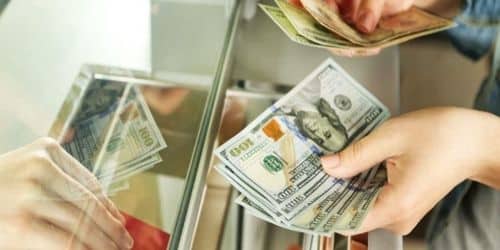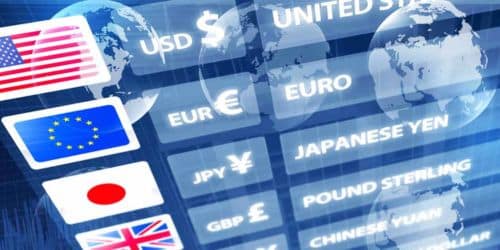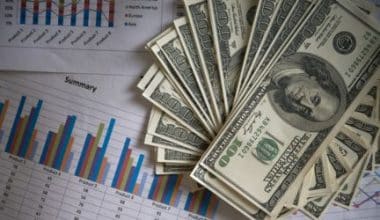If you want to travel abroad, you’ll most definitely need access to foreign currency. While you may use a credit or debit card for all of your purchases, you risk squandering too much money on foreign transaction fees. One method to avoid this is to exchange the currency and carry cash with you. While accessing foreign currency can be costly at times, here are some ways you exchange currency fast and at cheaper rates. Before that, let’s first understand how foreign currency exchange works
How Does Foreign Currency Exchange Work?
Because the global economy operates 24 hours a day, foreign exchange prices are constantly moving. The relative value of currencies fluctuates as economies strengthen and weaken, currencies undergo inflation and deflation, and trade imbalances increase and shrink.
The current market exchange rate between two currencies is determined by financial institutions, investors, and speculators regularly buying and selling big amounts of currencies. Currency exchange rates are generally offered against the US dollar, the British pound, the euro, and the Swiss franc because these are the most stable and extensively used currencies for significant business transactions.
When you travel abroad and want to buy anything in the local currency, you usually exchange a small quantity of currency and pay a higher exchange rate so that the currency exchange may make a tiny profit.
Not all currency exchanges charge the same rate, and some firms benefit by exploiting needy travelers in tourist regions.
The Best Ways To Exchange Currency
#1. Visit Your Local Bank
Many banks and credit unions charge a fee for foreign currency conversion services. Some banking institutions will even order currency for you or allow you to order it online and have it delivered to your door. That could be a quick and easy way to receive the money you need for your trip. However, if you have to pay shipping expenses, you could end up losing a lot of money.
Buying foreign money in person from your local bank branch is a less expensive option. As a regular customer, you may not have to pay any fees at all. Furthermore, larger banks frequently have access to the greatest exchange rates. The procedure is straightforward, and you may be able to exchange the funds you require in a matter of minutes.
#2. Go to an ATM
If you are unable to visit a bank branch before leaving, another option is to use an ATM. If the ATM can conduct foreign transactions, you should pay little to no fees for withdrawals as long as it is within your bank’s network. Ootherwise, you could withdraw US dollars and exchange them for the market rate when you reach the nation.
You can also learn if your bank has an overseas affiliate. If it does, you might be able to withdraw money from one of their ATMs when you get there. If you have to pay fees, it may be a good idea to withdraw as much money as you can at once to avoid incurring fees for smaller withdrawals.
#3. Think about obtaining traveler’s checks
Buying traveler’s checks is another way to convert cash. Most banks and credit unions sell travelers checks. You may be able to purchase them from your bank or credit union, but you will most likely be charged a modest cost. Again, if you don’t want to pay more to have them shipped to you, coming into the bank and purchasing them from a teller is an excellent choice.
If your bank does not sell traveler’s checks, there may be another bank in your area that does, and your bank may even be able to suggest you. Many traveler’s checks are issued by American Express. If you go to their website, you may enter your address and get a list of the banks that offer traveler’s checks in your area. However, if you do not have a bank account, the fee you must pay may be larger.
The advantage of traveler’s checks is that you can easily order replacements if you misplace them or if they are stolen. Furthermore, once you have them, you are the only person who can exchange them for foreign currency. The disadvantage is that not all companies will allow you to use them to make purchases. So, after you get to your location, you’ll most likely need to find a bank that accepts travelers’ checks.
A prepaid travel credit card, such as those issued by American Express and MasterCard, is another option. They provide some of the same advantages as traveler’s checks, but without the trouble of needing to cash the checks.
#4. Purchase Currency from a Foreign Bank Branch
Opening a bank account in a foreign nation may make sense if you visit there frequently or if you own property there. If the bank sells currency, you may have to wait until you arrive to obtain the amounts you require. Setting up an account may take some time, so either does it ahead of time or establish the account so you may use it later during your next trip.
Even if you do not open a foreign bank account, some banks may be able to exchange currencies for you. If they agree, you will very certainly have to pay a fee, just like you would in the United States if you aren’t a banking customer.
#5. Purchase Currency Online
Foreign cash can be purchased from a variety of online bureaus. However, in order to get the most money at the lowest possible rate, you must conduct some research. Travelmoneymax.com is the only website that allows you to easily compare different bureaus and select the ones that offer the best exchange rates. You may be able to avoid paying a shipping fee if you order big quantities of cash at once.
Where Can You Exchange Your Currency in the United States Before Your Trip?
If you haven’t packed your belongings yet, you may still have time to secure the best currency conversion rates before you depart. Many banks provide currency exchange services to their consumers. Despite the fact that there may be a tiny cost if you convert less than a specific amount, your bank or credit union is nearly always the best place to exchange currencies (and the cheapest).
You might be able to order money in a branch, over the phone, or online and have it delivered to you or picked up at a branch. Some currency suppliers allow you to pick up your funds the next day, have them delivered within one to three working days, or have them shipped overnight.
You can also use an online currency converter to have the cash delivered to your home. However, exchange rates are less favorable, and delivery fees may deplete your funds. Airport kiosks or stores should only be used as a last resort. The exchange rate is bad, and the costs are exorbitant.
Where Can I Receive Foreign Currency Outside of the United States?
When you arrive at your destination, avoid airport kiosks and other exchange houses. The ATM network of your bank is most likely the best option. You may be able to withdraw money in the local currency at favorable exchange rates and with modest costs (1% to 3%).
To locate an ATM near you, use the app provided by your financial institution. If your bank imposes ATM fees, try withdrawing bigger amounts. Also, avoid using out-of-network ATMs because, in addition to a possible foreign transaction cost, you may be charged fees by your bank and the ATM owner.
How To Exchange Currency Without Fees?
The best strategy to avoid fees while exchanging cash abroad is to use your bank’s ATM network. Check ahead of time to determine if your bank has an ATM network at your location, so you can avoid costly expenses.
Where Is It Cheaper To Exchange Currency After Your Journey?
Again, your bank is generally the best place to exchange currency, but not all types are accepted. If not, you can swap your money at a currency exchange shop or an airport kiosk, however, you won’t likely obtain the greatest rate.
If you are unable to sell your foreign currency, you may be able to donate it at the airport or during your travel. Ten international airlines participate in UNICEF’s Change for Good initiative, which accepts foreign currency donations to help better the lives of children throughout the world. If you’ve already returned home, you can ship any remaining foreign currency to the program’s office.
Is It Better To Exchange Money At Home Or Abroad?
It’s much better to exchange your money at home than abroad. If you don’t have time to go to the bank before your trip, it’s tempting to buy foreign money at an airport kiosk or currency exchange counter. These shops provide convenience, but their exchange rates are often substantially lower than those offered by your local bank.
What Is The Best Way To Exchange A Large Amount Of Money?
In the past, you had two options: a high-street bank or a currency exchange specialist. When exchanging significant quantities of currency, a specialist is often more cost-effective because they conduct transfers in bulk, allowing them to offer more competitive rates and fees – as well as expert tools to assist you to make the most of the market.
Tools for Transferring Large Amounts of Money
The ideal method to exchange a significant sum of money is to use a specialized tool that will take the risk out of your transfer and allow you to plan ahead with certainty.
#1. A spot contract
This contract allows you to buy or sell a currency for immediate delivery, for example, if you wish to make a transfer all at once or you know you only have one transfer to complete. Spot contracts are perfect for acquiring property abroad, receiving money from a loved one, or paying for an overseas wedding.
#2. A currency forward contract
If you are moving a large sum of money or sending money on a regular basis, a foreign exchange specialist can put up a currency forward contract to safeguard against future rate swings and lock in a currency exchange rate for up to two years. (It should be noted that such contracts may involve a deposit.)
#3. A market order, often known as a stop-loss order
If timing is not an issue, you might place a market order’ in anticipation of a lower rate in the future. If that rate is attained, the transfer will take place automatically. Similarly, stop-loss order’ allows you to specify a minimum price at which you will purchase or sell your currency. If this rate is reached, your order will be immediately completed.
Do You Need ID To Exchange Currency?
Many countries do not restrict foreign exchange transactions if the value is less than $1,000 USD, eliminating the need for ID.
In Conclusion,
If you’re traveling anywhere outside the United States, you’ll almost certainly require access to foreign funds. However, depending on where you go, you may have to pay a lot of money to exchange currency. Purchasing foreign currency from your bank and withdrawing money from an in-network ATM are two of the cheapest ways to obtain it. Keep in mind that whether you exchange currency at an airport, a currency exchange desk, or a hotel, you will almost certainly be charged greater costs.
Related Articles
- Top US Banks That Exchange Foreign Currency In 2023
- Banking and Finance: Why is it the most preferred career choice? (+ detailed guide)
- HOW TO START AN ATM BUSINESS IN 2023 : The Ultimate Guide
- STOCK EXCHANGE: Understanding the Stock Exchange
- International Student Loans US&UK: Best Loans of 2022 Updated!






